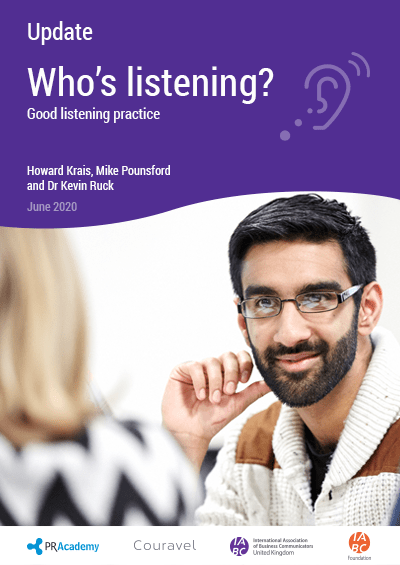Organisations still undervalue listening as a leadership capability
This is especially important during the current COVID-19 pandemic when the need for organisations to listen to employee concerns is greater than ever.
Carried out by the International Association of Business Communicators (IABC UK), PR Academy and Couravel, with the support of the IABC Foundation, the research explored the state of organisational listening through interviews with winners of IABC Gold Quill Awards.
Howard Krais of IABC UK explained the reason for the study: “We wanted to find out the best ways for organisations to listen and how listening needs to become business as usual.”
The report builds on research carried out in 2019: “Our earlier research found that organisations have lost the balance between ‘receive’ and ‘transmit’. With the growing use of video, social media and an explosion of channels the danger is that organisations forget that good communication starts with the ability to listen,” says Dr Kevin Ruck of PR Academy. “In fact, listening is now more important than ever. Leaders will be judged by how they listen to and care for their people.”
The report contains case studies and examples of good practice in listening plus a range of tools that leaders and communicators can use to improve the way they listen to employees.
Through the research, five principles for good listening were identified:
Openness: good listening requires an open mind
Planning: thorough planning across the organisation
Distributed leadership: listening needs to be led at multiple levels in the organisation
Empathic and creative: creating impactful and emotive feedback approaches
Human: understanding how people think and feel
“We hope that anyone wanting to devise new and innovative ways to listen to employees will find inspiration here, as well as advice on the tools that can be used,” says Mike Pounsford of Couravel. “Although the case studies were gathered pre-COVID, many can be adapted for an online environment and the principles we identified apply whatever the method being used.”
The report also sets out how organisations can assess their maturity in listening against a spectrum of approaches:
Passive: more opportunities for passive listening to check what people are thinking and feeling
Active: leaders showing that they are aware and responsive to needs of employees
Sensitive: opportunities for people to talk about how they are feeling
Deep: listening exercises that can result in a change in the way that the organisation does things
“Organisations that have processes in place to listen to employees right across the spectrum are going to experience better levels of engagement, advocacy, trust, innovation, resilience, learning and wellbeing,” says Ruck.

